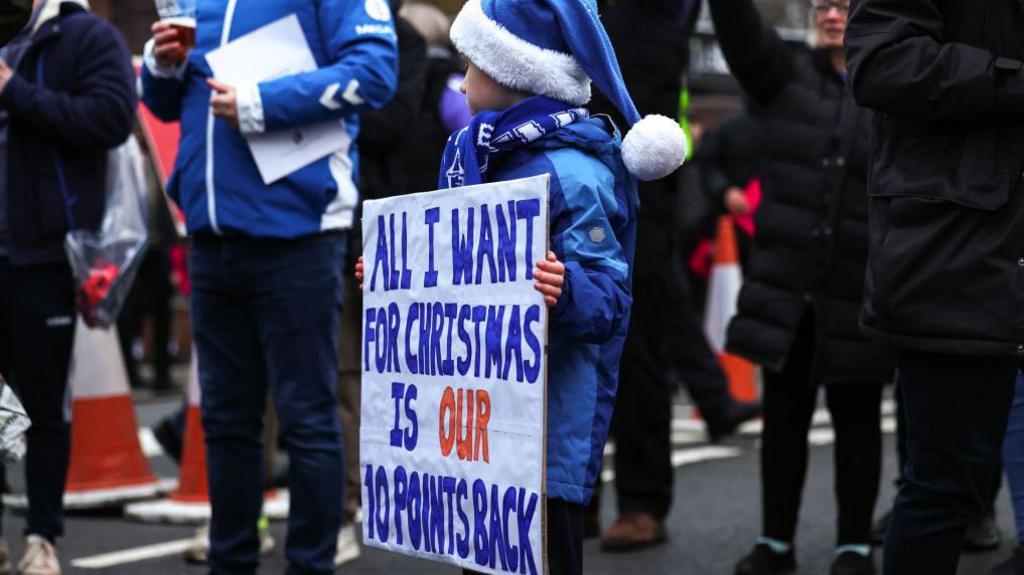What does Leicester's PSR win mean for rest of Premier League?

Everton fans were out in force protesting against their points deduction
- Published
Leicester's successful appeal against an alleged breach of Premier League financial rules means they are set to avoid any punishment or points deduction - but what does this mean for the rest of the Premier League?
Everton and Nottingham Forest were deducted points last season for breaching profit and sustainability (PSR) rules, which limits losses to £105m over a three-year period.
Meanwhile, Manchester City's hearing over 115 alleged breaches of financial regulations is expected to begin next month.
BBC Sport analyses the potential implications of Leicester's victory.
Timeline of Leicester City case
24 April 2023: Leicester change accounting period from 30 May 2023 to 30 June.
28 May 2023: Leicester relegated from Premier League.
12 June 2023: Leicester formally cease to be Premier League club after transferring share to Luton.
30 June 2023: Accounting period for 2022-23 season ends.
21 March 2024: Leicester charged by Premier League for breaching PSR rules for three-year period up to 2022-23.
22 March 2024: Leicester appeal against the Premier League's charge.
26 April 2024: Leicester promoted back to Premier League.
3 September 2024: Leicester win appeal against Premier League charge
Why did Leicester win their PSR case?
Leicester were charged for allegedly breaching Rule E.49 of the Premier League PSR regulations because their three-year rolling losses of £129.4m, up to the end of the 2022-23 season, were over the allowed threshold of £105m.
Following their relegation from the Premier League in May the Foxes officially ceased to be a top-flight side when they transferred their share to Luton in mid-June 2023.
Leicester successfully argued that because their 2022-23 accounting period ended on 30 June, they were not longer bound by Premier League rules and so could not be found in breach.
The Foxes had earlier changed the end of their accounting period from 30 May to 30 June, though the commission said there was not "anything untoward" with the move and it complied with accounting rules.
Will the Premier League appeal and what could they do in the future?
Technically, the Premier League could appeal, but it is unlikely because the bar is so high on what they need to prove.
The issue is with the wording of the Premier League’s own rules rather that the validity of the judgement.
It has created a situation where relegated clubs are no longer part of the Premier League if their three-year accounting period ends on 30 June. The ruling says because of that, the Premier League has no authority to charge clubs because they are not members.
The league could re-write the rules to make them tighter and less ambiguous, avoiding a similar situation in the future.
Could Leicester still be charged?
Leicester could also be charged again if they are found in breach for the next accounting period for 2023-24.
The Foxes will have permitted losses of £83m for the three-year period up to June 2024, which is reduced from £105m because one season was spent in the Championship.
The Premier League usually announce PSR charges around December.
Or will Leicester be dealt with by the EFL?
In March, the English Football League (EFL) began an inquiry into a possible breach of its own financial rules by the Foxes for the three-year period up the end of the 2023-24 season.
The club were placed under a transfer embargo and asked to submit a business plan on how it would comply with the rules. But an independent Club Financial Reporting Panel (CFRP) concluded that under the rules "as currently written", Leicester were "under no obligation" to do so.
In theory, the EFL should be the assessing body for the financial cycle ending 30 June 2024 but by that time, Leicester had received its shareholder certificate following their promotion back to the top flight.
The EFL may also have to re-write and tighten the rules around such scenarios.
In a statement on Thursday, the EFL said it is "reviewing the decision in full" and will reserve further comment until "any possible appeal process initiated by the Premier League has concluded, and or any action is taken by the EFL."
It added: "We share the frustrations of the Premier League. It cannot be right that clubs potentially escape the scrutiny of the agreed rules and sanctions due to movement across the divisions."
What are the Championship spending rules?
Championship clubs are allowed to lose £39m over a three-year cycle, so £13m a year. However, this is expected to be raised to £41.5m during the coming season.
Because Leicester were in the Premier League for two of the previous seasons, Rule 3.1 of the EFL's regulations allow losses of £83m.
What does this all mean for Nottingham Forest?
Nottingham Forest were deducted four points in March after an independent commission ruled the club's losses to 2022-23 breached the allowed threshold by £34.5m.
Forest's maximum loss was limited to £61m as they spent two years of the assessment period in the Championship.
They failed with an appeal in May but survived relegation by finishing 17th last season, six points above the drop zone.
It is not clear whether this ruling means the Premier League has no authority to take action for any period where a club is not a member, or just to charge them at the end of a three-year cycle. The Premier League may need to tighten the rules in this case.
What does this mean for Everton?
Everton were deducted a total of eight points last season for two separate breaches across different accounting periods.
Because they were a Premier League club throughout the period for which they have been charged, the above situation does not apply.
Their first points deduction was reduced from 10 points to six on appeal and then withdrew their appeal for the second breach and ended the season in 15th.
Part of the second charge relating to interest costs associated with the building of the club's new stadium has been deferred but could yet result in another points deduction.
We will find out if they have breached PSR limits for a third time at the end of December when the Premier League issue charges for any clubs they believe have overspent in the period ending 30 June 2024.
Can the Premier League change the rules this season?
In theory, yes. But it will need to draft a rule amendment pretty quickly and get it voted through before it issues charges for alleged 2023-24 breaches in December.
What about the new PSR rules?
A new type of PSR, based around anchoring spending limits to the club with the least amount of revenue, is being run in shadow form this season.
However, this is being done because no agreement was reached amongst clubs at their annual meeting in the summer to adopt them permanently.
It was felt better to assess how they go this season and look at the modifications needed, sticking with existing PSR rules for the 2024-25 campaign.
A decision to change that would require a mid-season agreement from the clubs who did not think it was a good idea a couple of months ago, so highly unlikely.
However, the Premier League’s defeat over the Leicester appeal does reinforce a mounting sense that the current PSR rules are not fit for purpose.
This all comes after concerns earlier this year that some clubs may be looking to sell each other players at high valuations, or sell fixed assets to sister companies, in order to exploit potential weaknesses - or 'loopholes' - in the rules.
What about Uefa's financial rules?
European governing body Uefa has its own rules in place that will eventually limit clubs to spending 70% of their revenue on wages.
However, it does not apply in this scenario because Leicester, Nottingham Forest and Everton are not competing in Europe.
If, for instance, Leicester qualified for Europe this season – so for 2025-26 – Uefa would look at their income for that season, by which time the 70% limit will be in force.
What does this mean for Manchester City?
In February 2023, the Premier League charged Manchester City with 115 alleged breaches of its financial rules between 2009 and 2018 and referred the club to an independent commission.
BBC Sport understands the hearing is set to start in September with the result possibly known early next year.
City have denied all charges and say they are supported by a "body of irrefutable evidence".
Premier League chief Richard Masters told BBC Sport in August that it was "time to resolve" City's long-running case - and added on PSR rules more generally that "we want to move to a new system that people have confidence in and can comply with".
With Leicester arguing that their successful appeal was based on “flaws” in the Premier League rules, Manchester City may be encouraged by this outcome, but it is uncertain how relevant this very different case is to theirs. City obviously cannot rely on what may appear to be something of a technicality over the date of relegation. Nor is their case about a PSR overspend.
However, this was still a significant defeat for the Premier League and City's illustrious legal team will certainly scrutinise the wording of the rules to see if they are being correctly applied.
- Published16 September 2024

- Published13 August 2024

- Published11 August 2023
